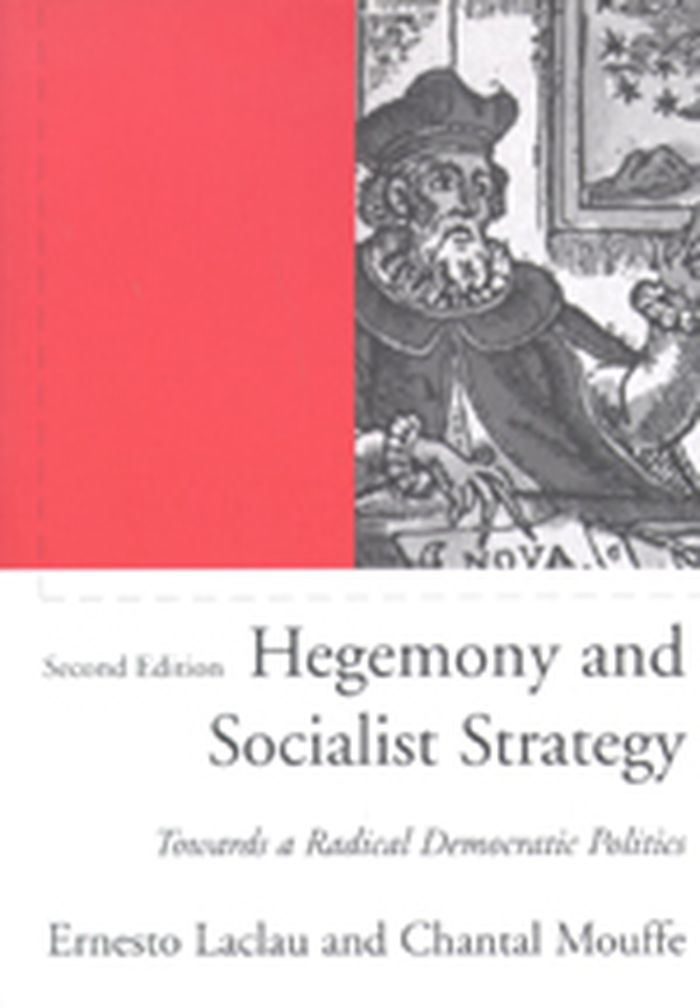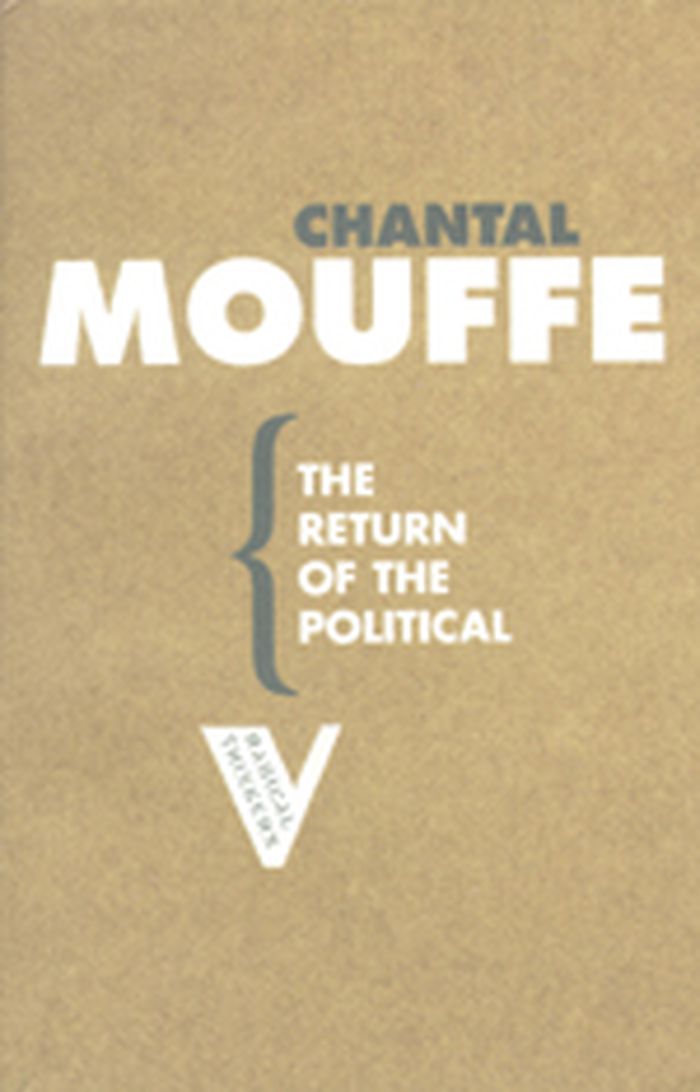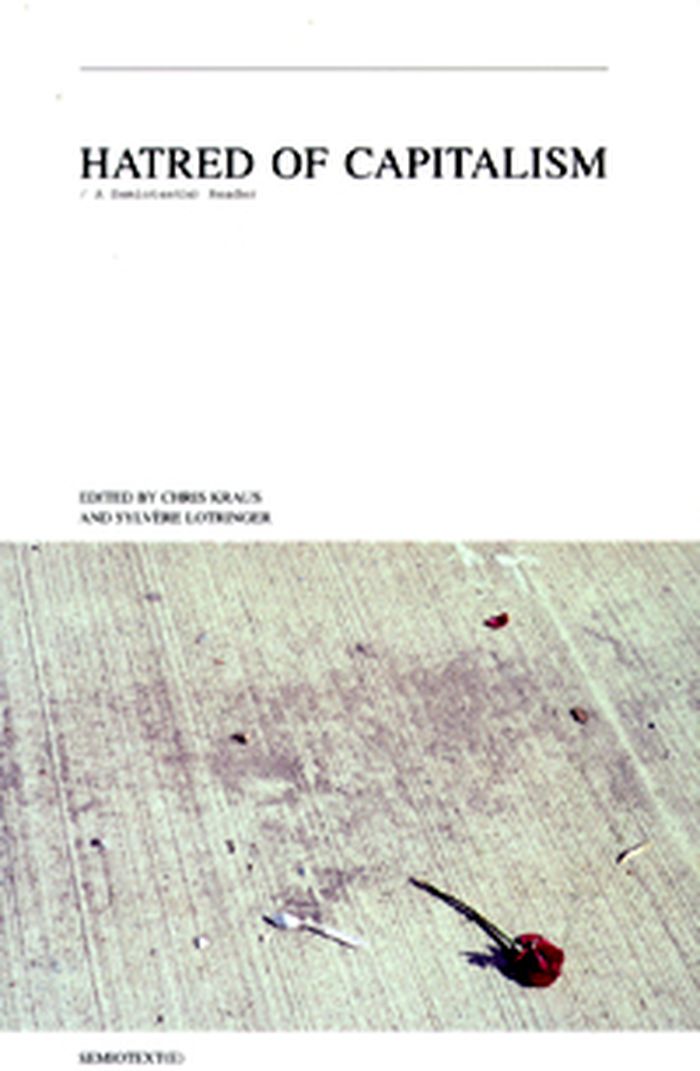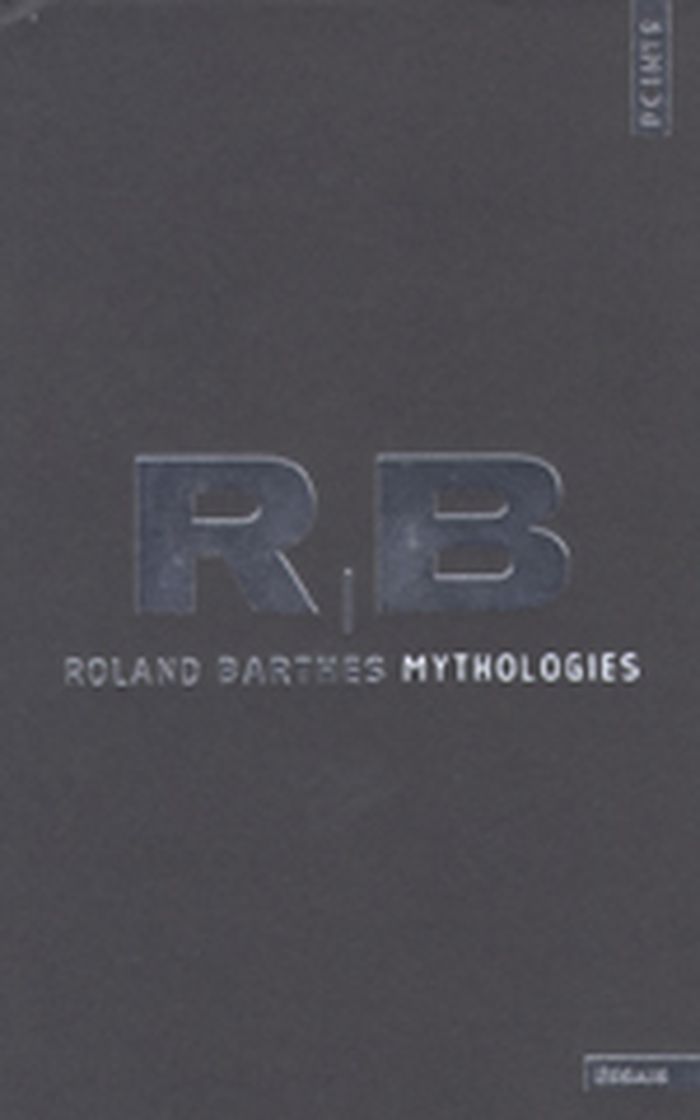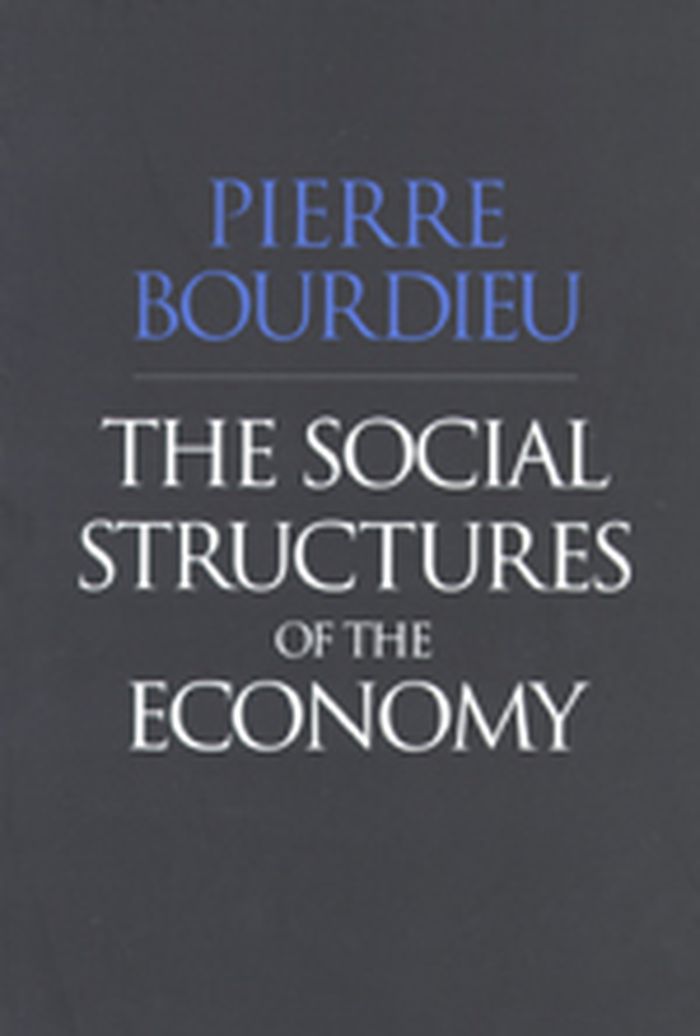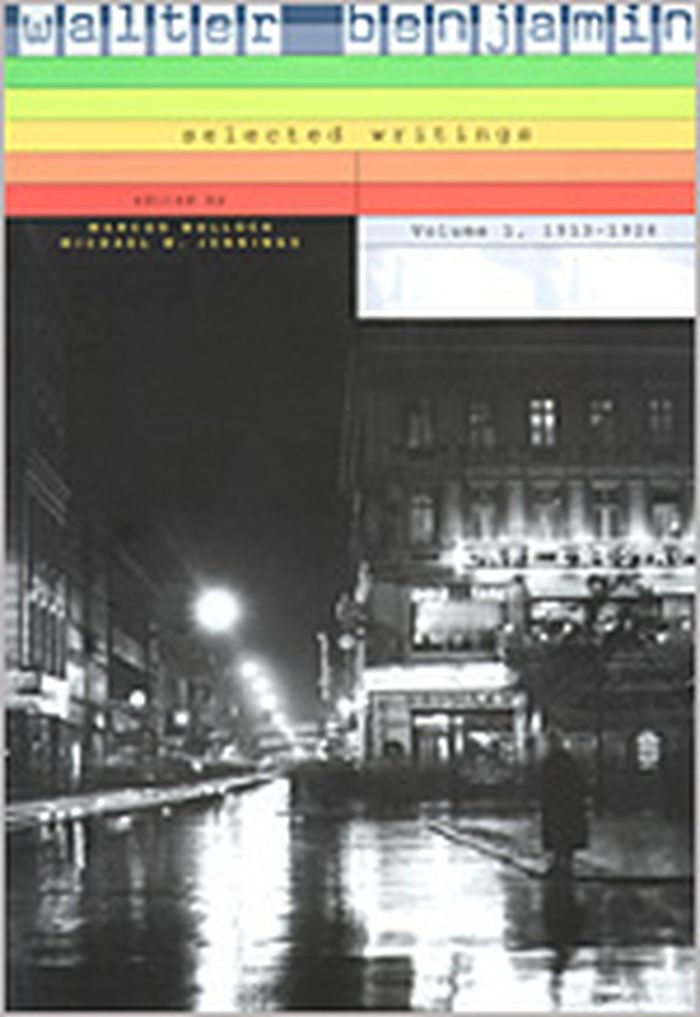Walter Benjamin's Archive
$35.00
(disponible sur commande)
Résumé:
The works of the great literary and cultural critic Walter Benjamin are a reservoir of texts, commentaries, scraps and fragments of everyday life, arts and dreams. This beautifully designed book gives an insight into Benjamin's habits of collecting and archiving through some of his most personal documents. From notebooks in which every conceivable space is covered with(...)
Théorie/ philosophie
novembre 2007, London, New York
Walter Benjamin's Archive
Actions:
Prix:
$35.00
(disponible sur commande)
Résumé:
The works of the great literary and cultural critic Walter Benjamin are a reservoir of texts, commentaries, scraps and fragments of everyday life, arts and dreams. This beautifully designed book gives an insight into Benjamin's habits of collecting and archiving through some of his most personal documents. From notebooks in which every conceivable space is covered with handwriting, and a heartfelt traveller's series of postcards, to a sequence of Benjamin's own photographs, and lists that include a collection of his son Stefan's early words and sentences, this wonderful collection testifies to Benjamin's complex and kaleidoscopic passion for the ephemera of human life. Illustrated throughout in color and black and white.
Théorie/ philosophie
$26.00
(disponible sur commande)
Résumé:
How is the present crisis of left-wing thought to be understood? To what extent does it call into the question the idea of social totality that underpinned Marxism and many other socialist theories? Does the concept of hegemony imply a new logic that goes beyond the essentialism of classical Marxist thought? These are some of the questions that this now seminal book(...)
Théorie/ philosophie
mai 2001, London, New York
Hegemony and socialist strategy : towards a radical democratic politics, second edition
Actions:
Prix:
$26.00
(disponible sur commande)
Résumé:
How is the present crisis of left-wing thought to be understood? To what extent does it call into the question the idea of social totality that underpinned Marxism and many other socialist theories? Does the concept of hegemony imply a new logic that goes beyond the essentialism of classical Marxist thought? These are some of the questions that this now seminal book attempts to answer. It traces the genealogy of the present crisis, from the nineteenth-century debates to the contemporary emergence of new forms of struggle, making it a classic text both for understanding hegemony and for focusing on present social struggles and their significance for democratic theory.
Théorie/ philosophie
The return of the political
$14.00
(disponible sur commande)
Résumé:
An original and powerful statement which enables us to close the widening gap between liberal democracy and the events of a disordered world. Chantal Mouffe is a Senior Research Fellow at the Centre for the Study of Democracy at the University of Westminster. Her previous books include The Return of the Political; Hegemony and Socialist Strategy (with Ernesto Laclau);(...)
The return of the political
Actions:
Prix:
$14.00
(disponible sur commande)
Résumé:
An original and powerful statement which enables us to close the widening gap between liberal democracy and the events of a disordered world. Chantal Mouffe is a Senior Research Fellow at the Centre for the Study of Democracy at the University of Westminster. Her previous books include The Return of the Political; Hegemony and Socialist Strategy (with Ernesto Laclau); The Dimensions of Radical Democracy; and The Challenge of Carl Schmitt, all from Verso.
Théorie/ philosophie
Hatred of Capitalism
$20.95
(disponible sur commande)
Résumé:
Compiled in 2001 to commemorate the passing of an era, Hatred of Capitalism brings together highlights of Semiotext(e)'s most beloved and prescient works. Semiotext(e)'s three-decade history mirrors the history of American thought. Founded by French theorist and critic Sylvere Lotringer as a scholarly journal in 1974, Semiotext(e) quickly took on the mission of melding(...)
Théorie/ philosophie
novembre 2005, Los Angeles, New York
Hatred of Capitalism
Actions:
Prix:
$20.95
(disponible sur commande)
Résumé:
Compiled in 2001 to commemorate the passing of an era, Hatred of Capitalism brings together highlights of Semiotext(e)'s most beloved and prescient works. Semiotext(e)'s three-decade history mirrors the history of American thought. Founded by French theorist and critic Sylvere Lotringer as a scholarly journal in 1974, Semiotext(e) quickly took on the mission of melding French theory with the American art world and punk underground. Its Foreign Agents, Native Agents, Active Agents and Double Agents imprints have brought together thinkers and writers as diverse as Gilles Deleuze, Assata Shakur, Bob Flanagan, Paul Virillio, Kate Millet, Jean Baudrillard, Michelle Tea, William S. Burroughs, Eileen Myles, Ulrike Meinhof, and Fanny Howe. In Hatred of Capitalism, editors Kraus and Lotringer bring these people together in the same volume for the first time.
Théorie/ philosophie
Mythologies
$19.95
(disponible sur commande)
Résumé:
Notre vie quotidienne se nourrit de mythes : le catch, le striptease, l'auto, la publicité, le tourisme... qui bientôt nous débordent. Isolés de l'actualité qui les fait naître, l'abus idéologique qu'ils recèlent apparaît soudain. Roland Barthes en rend compte ici avec le souci - formulé dans l'essai sur le mythe aujourd'hui qui clôt l'ouvrage - de réconcilier le réel et(...)
Mythologies
Actions:
Prix:
$19.95
(disponible sur commande)
Résumé:
Notre vie quotidienne se nourrit de mythes : le catch, le striptease, l'auto, la publicité, le tourisme... qui bientôt nous débordent. Isolés de l'actualité qui les fait naître, l'abus idéologique qu'ils recèlent apparaît soudain. Roland Barthes en rend compte ici avec le souci - formulé dans l'essai sur le mythe aujourd'hui qui clôt l'ouvrage - de réconcilier le réel et les hommes, la description et l'explication, l'objet et le savoir. «Nous voguons sans cesse entre l'objet et sa démystification, impuissants à rendre sa totalité : car si nous pénétrons l'objet, nous le libérons mais nous le détruisons ; et si nous lui laissons son poids, nous le respectons, mais nous le restituons encore mystifié» Roland Barthes
Théorie/ philosophie
L'empire des signes
$17.95
(disponible sur commande)
Résumé:
Pourquoi le Japon ? Parce que c'est le pays de l'écriture: de tous les pays que l'auteur a pu connaître, le Japon est celui où il a rencontré le travail du signe le plus proche de ses convictions et de ses fantasmes, ou, si l'on préfère, le plus éloigné des dégoûts, des irritations et des refus que suscite en lui la sémiocratie occidentale. Le signe japonais est fort :(...)
L'empire des signes
Actions:
Prix:
$17.95
(disponible sur commande)
Résumé:
Pourquoi le Japon ? Parce que c'est le pays de l'écriture: de tous les pays que l'auteur a pu connaître, le Japon est celui où il a rencontré le travail du signe le plus proche de ses convictions et de ses fantasmes, ou, si l'on préfère, le plus éloigné des dégoûts, des irritations et des refus que suscite en lui la sémiocratie occidentale. Le signe japonais est fort : admirablement réglé, agencé, affiché, jamais naturalisé ou rationalisé. Le signe japonais est vide: son signifié fuit, point de dieu, de vérité, de morale au fond de ces signifiants qui règnent sans contrepartie. Et surtout, la qualité supérieure de ce signe, la noblesse de son affirmation et la grâce érotique dont il se dessine sont apposées partout, sur les objets et sur les conduites les plus futiles, celles que nous renvoyons ordinairement dans l'insignifiance ou la vulgarité. Le lieu du signe ne sera donc pas cherché ici du côté de ses domaines institutionnels: il ne sera question ni d'art, ni de folklore, ni même de «civilisation» (on n'opposera pas le Japon féodal au Japon technique). Il sera question de la ville, du magasin, du théâtre, de la politesse, des jardins, de la violence; il sera question de quelques gestes, de quelques nourritures, de quelques poèmes; il sera question des visages, des yeux et des pinceaux avec quoi tout cela s'écrit mais ne se peint pas.
Théorie/ philosophie
The Neutral
$50.00
(disponible sur commande)
Résumé:
"I define the Neutral as that which outplays the paradigm, or rather I call Neutral everything that baffles paradigm." With these words, Roland Barthes describes a concept that profoundly shaped his work and was the subject of a landmark series of lectures delivered in 1978 at the College de France, just two years before his death. Not published in France until 2002, and(...)
The Neutral
Actions:
Prix:
$50.00
(disponible sur commande)
Résumé:
"I define the Neutral as that which outplays the paradigm, or rather I call Neutral everything that baffles paradigm." With these words, Roland Barthes describes a concept that profoundly shaped his work and was the subject of a landmark series of lectures delivered in 1978 at the College de France, just two years before his death. Not published in France until 2002, and appearing in English for the first time, these creative and engaging lectures deepen our understanding of Roland Barthes' intellectual itinerary and reveal his distinctive style as thinker and teacher. "The Neutral" ( le neutre), as Barthes describes it, escapes or undoes the paradigmatic binary oppositions that structure and produce meaning in Western thought and discourse. These binaries are found in all aspects of human society ranging from language to sexuality to politics. For Barthes, the attempt to deconstruct or escape from these binaries has profound ethical, philosophical, and linguistic implications. "The Neutral" is comprised of the prewritten texts from which Barthes lectured and centers around 23 "figures," also referred to as "traits" or "twinklings," that are possible embodiments of the Neutral (sleep, silence, tact, etc.) or of the anti-Neutral (anger, arrogance, conflict, etc.). His lectures draw on a diverse set of authors and intellectual traditions, including Lao-tzu, Tolstoy, German mysticism, classical philosophy, Rousseau, Baudelaire, Walter Benjamin, and John Cage. Barthes' idiosyncratic approach to his subjects gives the lectures a playful, personal, and even joyous quality that enhances his rich insights. In addition to his reflections on a variety of literary and scholarly works, Barthes' personal convictions and the events of his life shaped the course and content of the lectures. Most prominently, as Barthes admits, the recent death of his mother and the idea of mourning shape several of his lectures.
Théorie/ philosophie
$31.99
(disponible sur commande)
Résumé:
Much orthodox economic theory is based on assumptions which are treated as self-evident : supply and demand are regarded as independent entities, the individual is assumed to be a rational agent who knows his interests and how to make decisions corresponding to them, and so on. But one has only to examine an economic transaction closely, as Pierre Bourdieu does here for(...)
The social structures of the economy
Actions:
Prix:
$31.99
(disponible sur commande)
Résumé:
Much orthodox economic theory is based on assumptions which are treated as self-evident : supply and demand are regarded as independent entities, the individual is assumed to be a rational agent who knows his interests and how to make decisions corresponding to them, and so on. But one has only to examine an economic transaction closely, as Pierre Bourdieu does here for the buying and selling of houses, to see that these abstract assumptions cannot explain what happens in reality. As Bourdieu shows, the market is constructed by the state, which can decide, for example, whether to promote private housing or collective provision. And the individuals involved in the transaction are immersed in symbolic constructions which constitute, in a strong sense, the value of houses, neighbourhoods and towns. The abstract and illusory nature of the assumptions of orthodox economic theory has been criticised by some economists, but Bourdieu argues that we must go further. Supply, demand, the market and even the buyer and seller are products of a process of social construction, and so-called 'economic' processes can be adequately described only by calling on sociological methods. Instead of seeing the two disciplines in antagonistic terms, it is time to recognize that sociology and economics are in fact part of a single discipline, the object of which is the analysis of social facts, of which economic transactions are in the end merely one aspect.
Théorie/ philosophie
The future of the image
$33.50
(disponible sur commande)
Résumé:
In "The future of the image", Jacques Rancière develops a fascinating new concept of the image in contemporary art, showing how art and politics have always been intrinsically intertwined. Covering a range of art movements, and thinkers such as Foucault, Deleuze, Adorno, Barthes, Lyotard and Greenberg, Rancière argues that contemporary theorists of the image are suffering(...)
The future of the image
Actions:
Prix:
$33.50
(disponible sur commande)
Résumé:
In "The future of the image", Jacques Rancière develops a fascinating new concept of the image in contemporary art, showing how art and politics have always been intrinsically intertwined. Covering a range of art movements, and thinkers such as Foucault, Deleuze, Adorno, Barthes, Lyotard and Greenberg, Rancière argues that contemporary theorists of the image are suffering from religious tendencies. He suggests that there is a stark political choice in art : it can either reinforce a radical democracy, or create a new reactionary mysticism. For Rancière there is never a pure art : the aesthetic revolution will always embrace egalitarian ideals.
Théorie/ philosophie
$29.95
(disponible sur commande)
Résumé:
Volume I of the Selected Writings brings together essays long and short, academic treatises, reviews, fragments, and privately circulated pronouncements. The volume includes a number of his most important works, including "Two Poems by Friedrich Hölderlin," "Goethe's Elective Affinities," "The Concept of Criticism in German Romanticism," "The Task of the Translator," and(...)
Théorie/ philosophie
mars 2004, Cambridge, Mass. / London
Walter Benjamin : selected writings volume 1, 1913-1926
Actions:
Prix:
$29.95
(disponible sur commande)
Résumé:
Volume I of the Selected Writings brings together essays long and short, academic treatises, reviews, fragments, and privately circulated pronouncements. The volume includes a number of his most important works, including "Two Poems by Friedrich Hölderlin," "Goethe's Elective Affinities," "The Concept of Criticism in German Romanticism," "The Task of the Translator," and "One-Way Street."
Théorie/ philosophie

